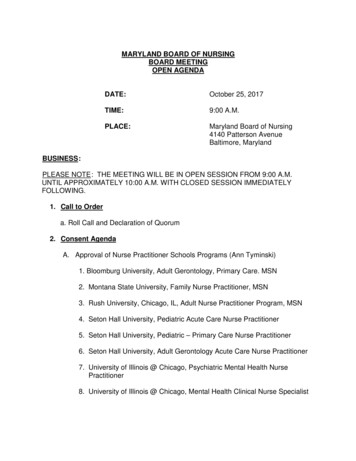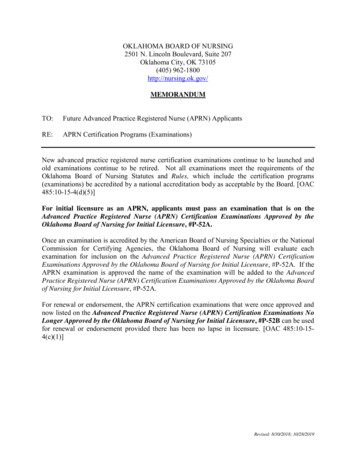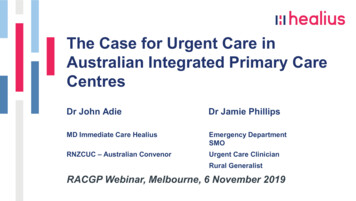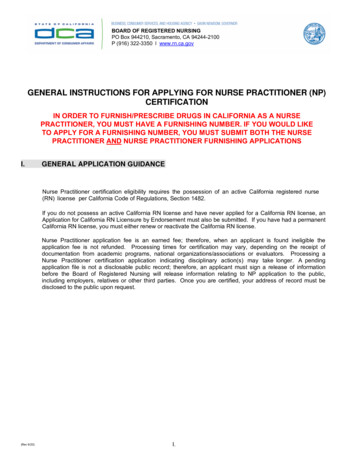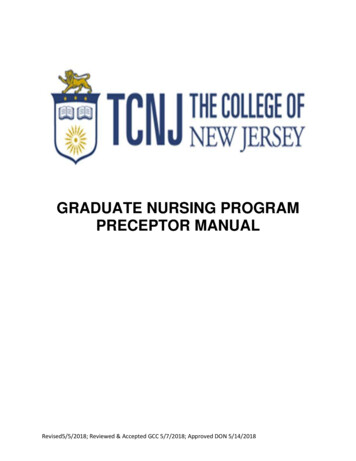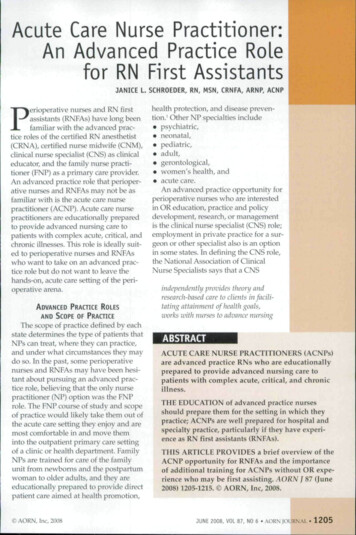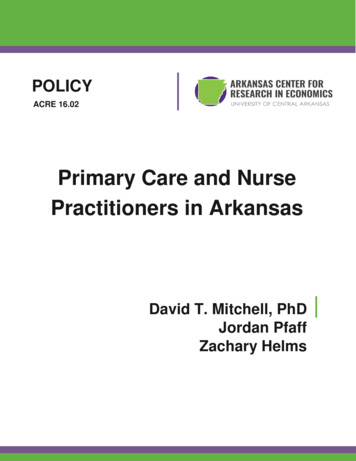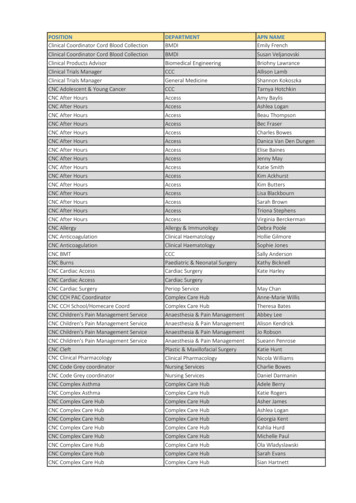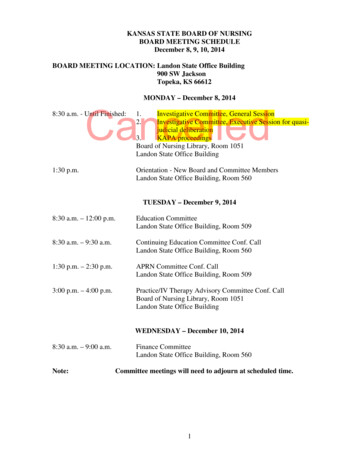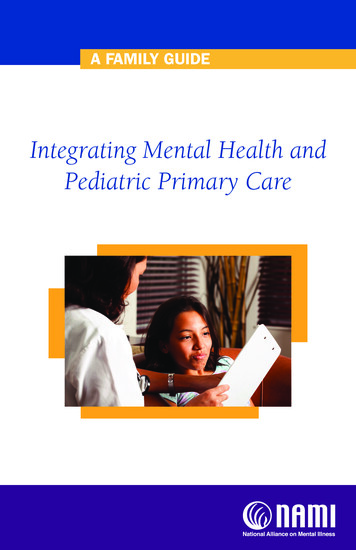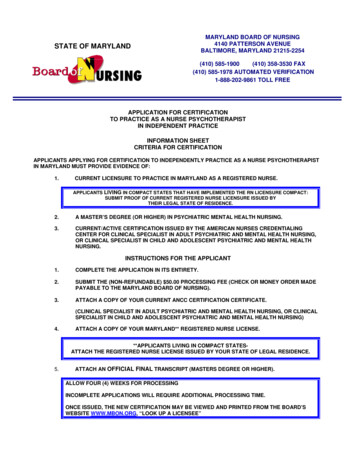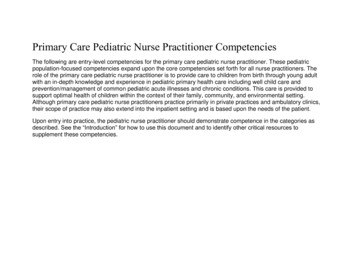
Transcription
Primary Care Pediatric Nurse Practitioner CompetenciesThe following are entry-level competencies for the primary care pediatric nurse practitioner. These pediatricpopulation-focused competencies expand upon the core competencies set forth for all nurse practitioners. Therole of the primary care pediatric nurse practitioner is to provide care to children from birth through young adultwith an in-depth knowledge and experience in pediatric primary health care including well child care andprevention/management of common pediatric acute illnesses and chronic conditions. This care is provided tosupport optimal health of children within the context of their family, community, and environmental setting.Although primary care pediatric nurse practitioners practice primarily in private practices and ambulatory clinics,their scope of practice may also extend into the inpatient setting and is based upon the needs of the patient.Upon entry into practice, the pediatric nurse practitioner should demonstrate competence in the categories asdescribed. See the “Introduction” for how to use this document and to identify other critical resources tosupplement these competencies.
Competency AreaScientificFoundationCompetenciesNP Core CompetenciesPrimary Care Pediatric NPCompetencies1. Critically analyzes data andevidence for improving advancednursing practice.1. Contributes toknowledgedevelopment forimproved child andfamily centered care.2. Integrates knowledge from thehumanities and sciences within thecontext of nursing science.2. Participates in child andfamily focused qualityimprovement, programevaluation, translationand dissemination ofevidence into practice.3. Translates research and otherforms of knowledge to improvepractice processes and outcomes.UW Madison SONCurriculum Content toSupport CompetenciesN726, N727, N826, andN906 (writing assignmentsand scholarly project)3. Delivers evidencebased practice forpediatric patients.4. Develops new practiceapproaches based on theintegration of research, theory,and practice knowledgeLeadership1. Assumes complex and advancedAdvocates for unrestrictedStudents complete 180
hip roles to initiate andguide change.Provides leadership to fostercollaboration with multiplestakeholders (e.g. patients,community, integrated health careteams, and policy makers) toimprove health care.Demonstrates leadership that usescritical and reflective thinking.Advocates for improved access,quality and cost effective healthcare.Advances practice through thedevelopment and implementationof innovations incorporatingprinciples of change.Communicates practiceknowledge effectively both orallyand in writing.Participates in professionalorganizations and activities thatinfluence advanced practicenursing and/or health outcomes ofa population focus.1. Uses best available evidence tocontinuously improve quality ofaccess to quality cost effectivecare within health careagencies for children andfamilies.clinical hours in the area ofleadership.N726 students worked withWisconsin Chapter ofNAPNAP to provideeducational resources onimmunizations that weredistributed to all statechapter members.Our Peds students areencouraged to joinWisconsin chapter ofNAPNAP and other Nursingorganiztions.Recognizes the importance ofcollaborating with local, stateand national childStudents participate in peerreview throughout theprogram. One example is
clinical practice.organizations to foster bestpractices and child safety.2. Evaluates the relationships amongaccess, cost, quality, and safetyand their influence on health care.the clinical project in N826.They must peer review 2classmates assignments.They also participate indiscussion boards in N726,N727, and N826 where theyare asked to review posts.3. Evaluates how organizational structure,care processes, financing,marketing and policy decisionsimpact the quality of health care.4. Applies skills in peer review to promotea culture of excellence.5. Anticipates variations in practice andis proactive in implementinginterventions to ensure quality.Practice InquiryCompetencies1. Provides leadership in thetranslation of new knowledge intopractice.2. Generates knowledge from clinicalpractice to improve practice andpatient outcomes.3. Applies clinical investigative skillsto improve health outcomes.4. Leads practice inquiry, individuallyor in partnership with others.1. Ensures pediatricassent and consent,and/or parentalpermission whenconducting clinicalinquiry.2. Promotes research thatis child-centered andcontributes to positivechange in the health ofN728, N729, N828, N829(Clinical Courses)
5. Disseminates evidence frominquiry to diverse audiencesusing multiple modalities.6. Analyze clinical guidelines forindividualized application intopracticeTechnology andInformationLiteracy1. Integrates appropriatetechnologies for knowledgemanagement to improve healthcare.2. Translates technical and scientifichealth information appropriate forvarious users’ needs.2.a Assesses the patient’s andcaregiver’s educationalneeds to provide effective,personalized health care.2.b Coaches the patient andcaregiver for positivebehavioral change.3. Demonstrates information literacyskills in complex decision making.4. Contributes to the design ofclinical information systems thatpromote safe, quality and costor the health caredelivered to children.1. Promotes developmentof information systemsto assure inclusion ofdata appropriate topediatric patients,includingdevelopmental andphysiologic norms.2. Considersdevelopmental level ofchild and the familywhen translating healthinformation to supportpositive healthoutcomes.3. Uses pediatric focusedsimulation basedlearning to improvepractice.N601, N726, N729, N826N601, N728, N729, N828Simulation is specificallyused in pediatrics in N601,N726, N728, and n826
effective care.5. Uses technology systems thatcapture data on variables for theevaluation of nursing care.Various EMR’s are used inclinical sites. Studentsbecome quite familiar withthe Wisconsin ImmunizationRegistryPolicyCompetencies1. Demonstrates an understanding ofthe interdependence of policy andpractice.2. Advocates for ethical policies thatpromote access, equity, quality,and cost.3. Analyzes ethical, legal, and socialfactors influencing policydevelopment.4. Contributes in the development ofhealth policy.5. Analyzes the implications of healthpolicy across disciplines.6. Evaluates the impact ofglobalization on health care policydevelopment.1. Advocates for local,state, and nationalpolicies to address theunique needs ofchildren and families.2. Uses relevant policyspecific to children todirect appropriatepatient care, and toadvocate againstfinancial and legislativerestrictions that limitaccess or opportunity.N906, N729 (policy project)Health DeliverySystem1. Applies knowledge oforganizational practices andcomplex systems to improve1. Optimizes outcomes forchildren and theirfamilies by facilitatingN728, N729, N828, N829
Competencieshealth care delivery.2. Effects health care change usingbroad based skills includingnegotiating, consensus-building,and partnering.3. Minimizes risk to patients andproviders at the individual andsystems level.4. Facilitates the development ofhealth care systems that addressthe needs of culturally diversepopulations, providers, and otherstakeholders.5. Evaluates the impact of healthcare delivery on patients,providers, other stakeholders, andthe environment.6. Analyzes organizational structure,functions and resources toimprove the delivery of care.7. Collaborates in planning fortransitions across the continuum ofcare.access to other healthcare services (e.g.mental health) or tocommunity andeducational settings.2. Facilitates parent-childshared managementand transition to adultcare asdevelopmentallyappropriate.3. Applies knowledge offamily, childdevelopment, healthywork environmentstandards andorganizational theoriesand systems to supportsafe, high quality, andcost effective carewithin health caredelivery systems.4. Facilitates transitionsacross settingsincluding health care,mental health,community andeducational services tooptimize outcomes.Transition to adult care istaught as a module in N826N906 (scholarly project)N826 students spend timelooking at resiliency in wellchildren and chronically illchildren. Comparing theneeds of both cohorts andfamily systems.
EthicsCompetencies1. Integrates ethical principles indecision making.2. Evaluates the ethicalconsequences of decisions.3. Applies ethically sound solutionsto complex issues related toindividuals, populations andsystems of care.IndependentPracticeCompetencies1 Functions as a licensedindependent practitioner.2 Demonstrates the highest level ofaccountability for professionalpractice.3 Practices independently managingpreviously diagnosed andundiagnosed patients.3.a Provides the full spectrum ofhealth care services toinclude health promotion,disease prevention, healthprotection, anticipatoryguidance, counseling,disease management,Ethical principles areintegrated throughout thecourse work and studentstake a class on ethics N708the summer before they starttheir clinical courses.1. Recognizes theimportance ofinterprofessional teampractice in providingsafe, comprehensiveclinical care.2. Obtains relevantcomprehensive problemfocused health historiesfor children withcomplex acute, critical,and chronic conditions.3. Applies advancedassessment skills todetermine appropriatemanagement in theClinical independence buildsas students work their waythrough the 1000 clinicalhours required to completethe program. DNP pediatricstudents are given feedbackby clinical preceptors andfaculty. They are placed inprimary care sites andspecialty care sites. UW hasa contract with the MadisonMetro School System so thatstudents have theopportunity to spend timewith NP’s in the schoolsettings. Throughout the
palliative, and end of lifecare.3.b Uses advanced healthassessment skills todifferentiate betweennormal, variations of normaland abnormal findings.3.c Employsscreeninganddiagnostic strategies in thedevelopment of diagnoses.3.d Prescribesmedicationswithinscope of practice.3.e Manages the health/illnessstatus of patients andfamilies over time.4. Provides patient-centered carerecognizing cultural diversity andthe patient or designee as a fullpartner in decision-making.4.a Works to establish arelationship with the patientcharacterized by mutual respect,empathy, and collaboration.4.b Creates a climate of patientcentered care to includecare of children withsingle and/or multisystem organdysfunction.4. Integrates knowledge ofpathophysiology toanticipate and identifyrapidly changingphysiologic conditionsand organ systemfailure in children.5. Responds to childrenwith complex acute,critical, and chronicproblems to addressrapidly changingconditions, including therecognition andmanagement ofemerging health crises,and organ dysfunctionusing bothphysiologically andtechnology deriveddata.6. Prioritizes datarecognizing thedynamic nature of achild with a complexacute, critical, andchronic condition.clinical courses studentshave the opportunity to workwith other disciplines tocoordinate culturallycompetent care for the childand the family system.
confidentiality, privacy, comfort,emotional support, mutual trust,and respect.4.c Incorporatesthepatient’scultural and spiritual preferences,values, and beliefs into healthcare.4.d Preserves the patient’s controlover decision making bynegotiating a mutually acceptableplan of care.7. Interprets age,developmental andsituational appropriatescreening anddiagnostic studiesessential in thediagnosis andmanagement of thechild with a complexacute, critical, orchronic healthcondition.8. Develops appropriatedifferential diagnosiswith an understandingof new or exacerbationof complex acute,critical, and chronicconditions.9. Provides ongoingmonitoring of childrenwith single or multisystem organdysfunction.10. Seeks and integratesthe perspectives ofinterprofessional teammembers in developing
and implementing theplan of care.11. Performs specificdiagnostic maneuversand/or technical skills tomonitor and sustainphysiological function.12. Appropriately ordersand performsinterventions to monitor,sustain and restorestability in children withdeteriorating conditions.13. Understands thecomplexity andinteraction ofprescribingpharmacologic andnon- pharmacologictherapies required inthe care of children withcomplex acute, critical,and chronic conditions.14. Prescribes medicationsand complex medicalregimes monitoring foradverse outcomes
specific to the child withhigh risk complexacute, critical, andchronic conditions.15. Manages the medicallyfragile technologydependent child whopresents with complexacute, critical, andchronic illness andinjury16. Stabilizes children inemergent and lifethreatening situations.17. Performs consultationsin a variety of settingsfor children withcomplex acute, criticaland chronic conditionsbased on knowledgeand expertise.18. Initiates and facilitatesthe child’s transitionwithin and outside ofthe health care settingand across all levels ofcare including
admission, transfer anddischarge.
The following are entry-level competencies for the primary care pediatric nurse practitioner. These pediatric population-focused competencies expand upon the core competencies set forth for all nurse practitioners. The role of the primary care pediatric nurse practitioner is to provide care to children from birth through young adult
